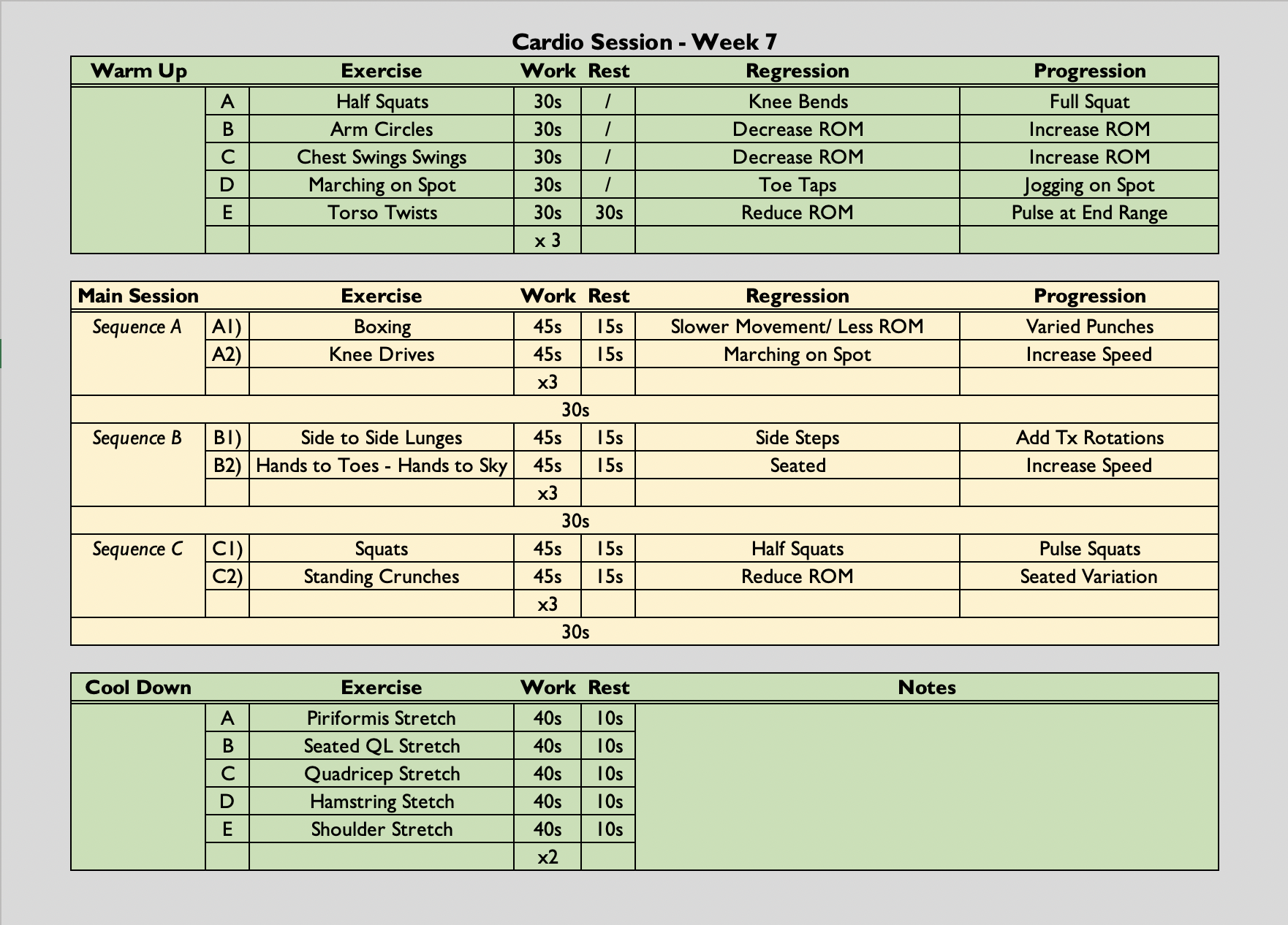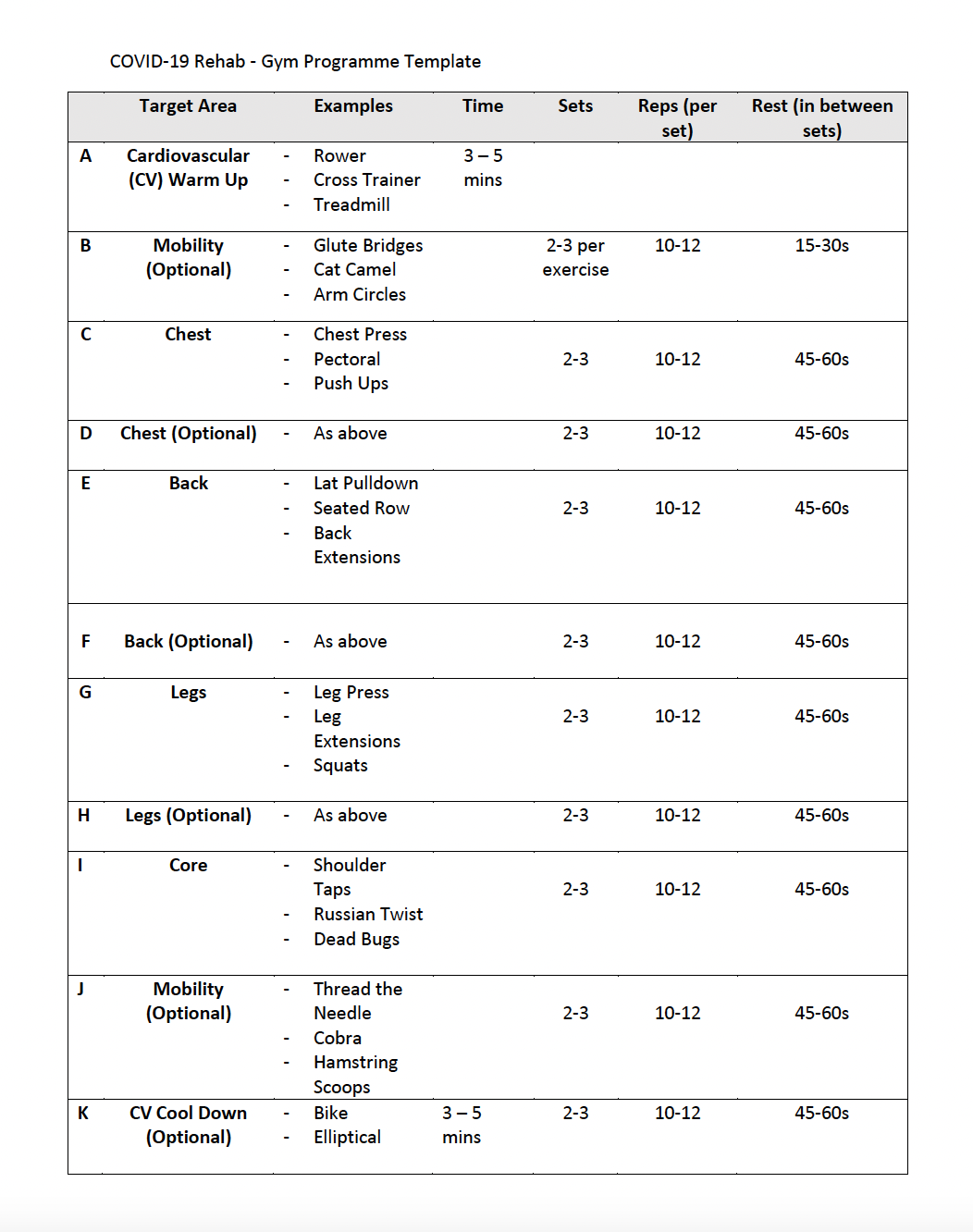3rd January- 9th January
- Hours: 15
Main Theme Addressed During Phone Calls
- Answering any further questions in regards to Week 7 transition
- Two individuals noted that they may need to some extra guidance on keeping within their energy expenditure allowance during gym sessions. Both of these individuals either enjoy the environment and/or kit available to them and were concerned they may get too excited and increase their intensity unintentionally.
Cardio Class
- ((45s secs x 2 followed by a 30 second rest) x 3) x 3
- The class is always symptom-led as opposed to graded exercise therapy. Participants are free to rest when needed. They can end the class early if they have reached their limit and they can reduce the amount of sets they do if necessary.

Drop-In Session
- Club tour
- Group gym induction
- Cardio, fixed resistance, functional equipment and floor space for body weight exercises.
- Discussed appropriate durations, reps ranges and rest periods.
- Durations for CV=3-5 minutes at a low to moderate intensity (should be able to maintain a conversation)
- Rep ranges for resistance exercises = 10-12 with 45-60s rest (moderate intensity), 12-15 with 30-45s rest (low intensity). Depending on their capabilities or confidence would dictate what rep range they chose. I advised those who had not been in a gym environment for quite some time, or those who are reducing the intensity of the group classes, to stick with 12-15 reps at a low weight. Whereas, those who felt. a bit more confident in the gym setting, or who were improving their exercise tolerance, to try 10-12 reps at a moderate weight.
- Generic exercise programme to guide structure

Analysis & Evaluation
- One participant is a physio and admits that the reason she sought this out as a career path was due to her love of physical activity and the gym environment.
- Another participant is a marathon runner, he has gradually be increasing the duration of his walks (10% rule), in the hope that he can slowly build up to a run/walk. He is excited to make use of the treadmills.
- I was particularly proud of both these participants during the gym induction as the entire session lasted around 90 minutes. The bulk of this was watching, learning and having a go on a couple of pieces of kit. The session generally lasts 2 hours – this is to allow participants to drop-in at any stage during this time rather than stay for 2 hours, the latter is unadvisable. At the end of the session both of the participants who stated they were worried that their eagerness might be a hinderance to their recovery, chose to leave as 90 minutes was enough for them that day. This also encouraged the rest of the group to reflect and they decided to end the session there rather than stay on and risk tipping their energy balance in the wrong direction. This day, for those two participants specifically, showed that they had really gotten to grips with listening to their body, understanding and controlling their triggers. If this wasn’t the case they would have chosen to stay on and let their excitement for the environment overrule what their body is capable of at the moment.
- Many people on the programme describe being frustrated that their body can’t do what it used to and have often pushed it beyonds its current limits. Rather than listening to their body, they try to overrule it with what they think it should be doing as opposed to understanding where its new limits lie and working within them to allow adequate recovery. I spend a lot of my time iterating to participants that they cannot let their pre-covid brain rule their post-covid body and I feel for the participants I highlighted this week, that the message has started to sink in and they are consciously working within their new limits.
Conclusion
- Even when you see a success like the one described this week, it doesn’t always translate to happy or please participants. I will praise them for setting boundaries and doing less to protect their energy levels whereas they may feel frustrated or limited. This highlights why rehabilitation is more than just physical recovery and the mind-set of individuals needs to be considered and addressed throughout the process.
Revisiting Reflection